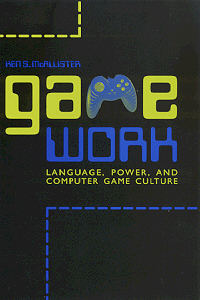introduction
|
| conclusion | |||
|
McAllister's Gamework: Language, Power, and Computer Game Culture provides scholars with an extremely flexible heuristic method that will help them come to terms with the computer games and the industries that produce them, and in doing so, locate sites at which they can influence this production, and therefore influence the direction of the computer game complex. In this respect, McAllister's grammar of gamework is as much an activist as an analytical method. It answers the call that Jameson makes at the end of his chapter on culture in PostModernism: The Cultural Logic of Late Capitalism, when he states that what is needed is An aesthetic of cognitive mapping—a pedagogical political culture which seeks to endow the individual subject with some new heightened sense of its place in the global system—will necessarily have to respect this now enormously complex representational dialectic and invent radically new forms in order to do it justice. (54) This is the strength of McAllister's approach. By providing scholars with a grammar that allows them to make sense and therefore locate themselves in relation to the otherwise contradictory networks of cultural, economic and socio-political production that are implicated in the computer game complex, it allows scholars to formulate a critical identity, a position from which they can engage the computer game complex in a critical conversation. As a part of this critical conversation, scholars may begin work that will transform it into an institution that, as McAllister states in the epilogue to his book, is more inclusive and culturally sensitive. In this respect, McAllister's GameWork: Language, Power, and Computer Game Culture has the potential to be useful not only to scholars who wish to understand the computer game complex and the networks of production that surround it, but to scholars who want to make sense of the more general question of cultural production in the context of third-stage capitalism. In particular, McAllister's book has a lot to contribute to the critical conversations that surround new media. Although McAllister does not explicitly address this subject in his book, his concern with mapping the present-tense interplay of ideology, rhetoric and dialectic within the computer game complex nevertheless provides an alternative approach to the positivistic discourse that marks attempts to define new media and to come to terms with its economic, cultural, and socio-political significance. |
